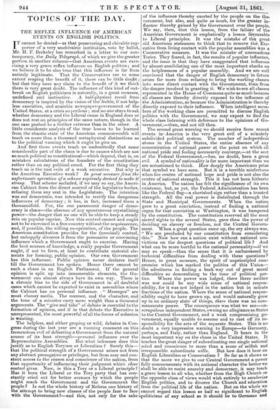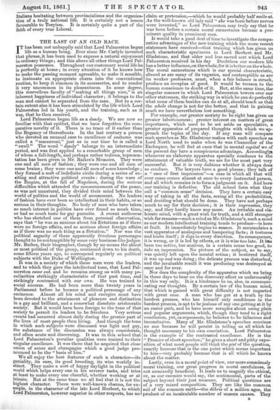TOPICS OF THE DAY.
THE REFLEX INFLUENCE OF AMERICAN EVENTS ON ENGLISH POLITICS.
IT cannot be denied—as that persevering and chivalric sup- porter of a very unchivalric institution, vote by ballot, Mr. H. F. Berkeley has remarked in a letter to our con- temporary, the Daily Telegraph, of which we give the greater portion in another column—that American events are exer- cising a very grave reflex influence on English politics ; and we believe it to be also true that this influence is far from entirely legitimate. That the Conservatives are to some extent reaping the benefit of it, there can be litt% doubt; but that they have any tlaim to the benefit of it we think there is very great doubt. The influence of this kind of out- break on English politicians is naturally, in a great measure, undefined and instinctive. A half-physical recoil from democracy is inspired by the vision of the feeble, if not help- less executive, and anarchic newspaper-government of the United States, at a crisis so perilous ; and no one stays to ask whether democracy and the Liberal cause in England does or does not rest on principles of the same nature, though in the one case pushed to a further extreme than in the other. A little considerate analysis of the true lesson to be learned from the chaotic state of the American commonwealth will teach us more than a thousand metaphysical distinctions as to the political warning which it ought to give us.
And first these events teach us undoubtedly that some considerable part of the chaos is due to causes which are not so much political as constitutional—which depend, that is, on mistaken calculations of the founders of the constitution rather than on any political creed. For the first thing they teach us is the vast evils of a weak executive. But why is the American Executive weak ? In great measure from the unfortunate operation of a scheme expressly devised to make it strong. That scheme secluded, if we may so say, the Ameri- can Cabinet from the direct control of the legislative bodies, refusing them any seat in the Legislature. The intention was not democratic, was intended to rectify the dangerous influences of democracy ; it has, in fact, increased them a thousandfold. For, the one paramount danger of demo- cracy is chaos—the absence of any spontaneous crystallizing power—the danger that no one will be able to keep a steady rein on popular caprice. Now this control cannot and ought not to be exercised in a free country without the acquiescence, and, if possible, the willing co-operation, of the people. The American constitution provides for the (nominal) control, but unhappily divorces it from the persuasive or convincing influence which a Government ought to exercise. Having the best sources of knowledge, a really popular Government ought, if not to form, at least to contribute material ele- ments for forming, public opinion. Our own Government has this influence. Public opinion never declares itself till the Government has spoken. Hence there cannot be such a chaos in an English Parliament. If the general opinion is split up into innumerable elements, the Go- vernment can almost always have its own way. There is a chronic bias to the side of Government in all doubtful cases which cannot be expected to exist in assemblies where the Cabinet has no personal influence. " Messages" are most clumsy media. The manner, and the character, and the tone of a minister carry more weight than a thousand arguments. The "give and take" of debate is essential to the formation of opinion, and if in that debate the Executive is unrepresented, the most powerful of all the forces of cohesion is wanting.
The helpless, and either groping or wild, debates in Con- gress during the last year are a running comment on this tremendous evil of debarring a Government from the natural source of its best strength—personal influence over the Representative Assemblies. But what inference does this justify as to English Toryism or Liberalism ? Surely this— that the political strength of a Government arises not from any abstract prerogative or privileges, but from easy and con- stant access to the reason and conscience of the nation, from that opportunity of influencing their judgment which close contact gives. Now, is this a Tory or a Liberal principle ? Has it been the Liberal or the Tory party that has con- stantly cried out for better avenues by which the people might reach the Government and the Government the people ? Is not the whole history of Reform one history of the attempt to bring new classes of the people face to face with the Government?—and this, not only for the sake of the influence thereby exerted by the people on the Go- vernment, but also, and quite as much, for the greater in- fluence thereby gained by the Government over the people. We say, then, that this lesson, from the failuke of the American Government is emphatically a lesson fa °usable to Liberal principles. It was the mistake of thk great old American statesmen to think that to remove th \ Exe- cutive from living contact with the popular assemblies was a Conservative measure. It was the mistake of unconscious Tories. They feared, in fact, the results of popular influence, and the issue is that they have exaggerated that influence by almost annihilating one of the most important checks on the helplessness of a popular assembly. And we are well convinced that the danger of English democracy in future arises far more from refusing to bring the working classes into some direct contact with the Government, than from the danger involved in granting it. We wish to see all classes represented in the House of Commons quite as much because all classes are thereby directly exposed to the influence of the Administration, as because the Administration is thereby directly exposed to their influence. When intelligent mem- bers of the working class are permitted to discuss English politics with the Government, we may expect to find the whole class listening with deference to the opinions of Go- vernment,—then, and not till then.
The second great warning we should receive from recent events in America is the very great evil of a minutely subdivided political system. The number of independent atoms in the United States, the entire absence of any concentration of national power at the point on which all national pride and feeling necessarily converge,—at the seat of the Federal Government,—has, no doubt, been a great evil. A symbol of nationality is far more important than we are accustomed to think. How deeply the Americans prize that symbol we have seen. But it is a terrible misfortune when the centre of national hope and pride is not also the centre of national strength. This it has not been hitherto in America. The nation has felt the significance of its own existence, but, as yet, the Federal Administration has been like the Federal flag—a cherished sign rather than a trusted strength. All the real power is distributed through the State and Municipal Governments. When the nation grew to a great conviction, instead of finding a national organ for that conviction at Washington, it was hampered by the constitution. The constitution reserved all the most sacred rights to the several States, gave them the power of deciding on slavery or freedom, not the Central Govern- ment. When a great question came up, the cry always was, "We are precluded by our constitution from considering this." Now how can a nation exist without national con- victions on the deepest questions of political life? And what can be more hurtful to the national personality—if we may so speak—than the sense that it is embarrassed by technical difficulties from dealing with these questions?
Hence, in great measure, the spirit of unprincipled com- promise which has marked the politics of this Union— the adroitness in finding a back way out of great moral difficulties so demoralizing to the tone of political par- ties. Where the power was lodged, there there neither was nor could be any wide sense of national respon- sibility, for it was not lodged in the nation but in minute fractions of the nation. Where the sense of national respon- sibility ought to have grown up, and would naturally grow up in an ordinary state of things, there there was no com- mensurate power. The consequence was what we see—un- scrupulous independent States, owning no allegiance as States to the Central Government, and a weak compromising go- vernment, equally unable to assume and to cast off its re- sponsibility for the acts of the separate States. This is no doubt a very impressive warning to Europe—to Germany, perhaps, and Italy, rather than England. It bears in the most important way on the chaos in the United States. It teaches the great danger of subordinating one single national mind and conscience to more than a score of selfish and irresponsible subordinate wills. But how does it bear on English Liberalism or Conservatism ? So far as it shows us that the more we give to our Central Government a power fully commensurate with its national character the better we shall be able to resist anarchy and democracy, it may teach a grave lesson to all who, whether from the High Church or the opposite class of views would wish entirely to secularize English politics, and to divorce the Church and education from the political life of the nation. But on the whole we cannot regard this lesson as half so significant to English .politicians of any school as it should be to Germans and Italians hesitating between provincialisms and the organiza- tion of a truly national life. It is certainly not a lesson favourable to Toryism. It is certainly quite a part of the faith of every true Liberal.































 Previous page
Previous page